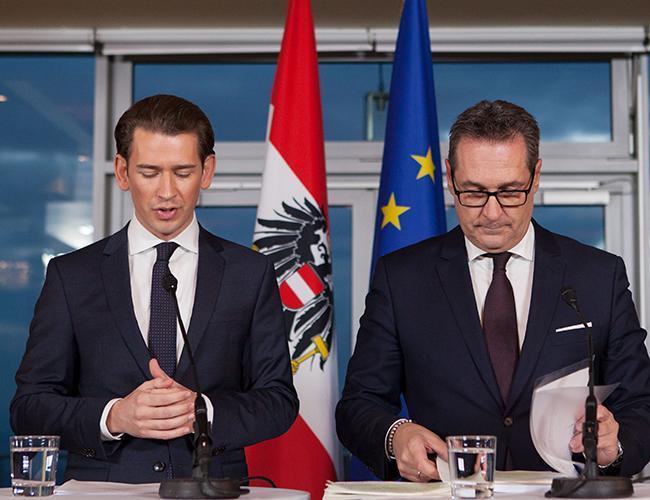Ankara blasts new Austrian coalition government’s Turkey program
ANKARA

The Turkish government has slammed Austria’s new coalition government over its program vowing to end Turkey’s accession process to the European Union and to find allies within the EU to this end.
“This unfortunate and short-sighted clause in the program of the new government in Austria unfortunately confirms concerns that this political line is based on discrimination and marginalization,” read a written statement issued by the Foreign Ministry on Dec 17.
Austria’s conservative People’s Party (OVP) and the far-right Freedom Party (FPO) on Dec. 15 announced the formation of a coalition government following October parliamentary elections. To be led by OVP leader Sebastian Kurz as the new chancellor, the coalition will be one of rare far-right governments in Europe.
One of the priorities of the new government will reportedly be finding like-minded partners within the EU in a bid to end Turkey’s accession process, which Ankara criticized as “unfriendly and dishonest.”
The Foreign Ministry statement recalled the commitments of the EU to Turkey through bilateral agreements, while vowing that if the Austrian government moves to realize this clause of the program it will “find a response.”
Çelik slams EU commissioner
Turkey’s EU Minister Ömer Çelik took to Twitter on Dec. 17 to criticize the new Austrian government.
“The government to be formed in Austria by (so-called) center right and far right parties has already begun attacking democratic values,” Çelik wrote.
Describing new Chancellor Kurz’s mindset “even more radical than far-right politicians,” Çelik said it was the first time that such a far-right coalition has formed a government in the EU.
Çelik also blasted the EU commissioner responsible for enlargement, Johannes Hahn, who is an Austrian national, for welcoming this new Vienna government to “the EU orientation.”
“What EU orientation? Mentioning EU orientation while ignoring racist reflections in government programs is a great blindness,” he wrote.
“In the face of so many crises in the world, the EU represents a stable order. The protection of this order is only possible with the protection of political values. This stability cannot be preserved if values are damaged,” Çelik added.
“The threats that put EU values at a risk are not coming from outside but inside the Europe as anti-Islam, anti-Semitic, anti-migration and xenophobic political parties are rising. This trend has now come to power in Austria,” he added, warning that Austria “has to take lessons from history” and seek an alliance with Turkey.
“This is the only way for a historical and strategic move against the crises that are shaking Europe,” Çelik tweeted.
Austria is set to become the only western European country with a far-right party in government after the anti-immigration Freedom Party and Sebastian Kurz's conservatives struck a coalition deal to share power almost equally.
In an early policy pronouncement, Kurz said the new government would not hold a referendum on European Union membership.
The FPO will take control of much of Austria's security apparatus, in charge of the foreign, interior and defence ministries. The OVP led by Kurz will control the powerful finance ministry as well the justice and agriculture portfolios.
"No one need be afraid," Austrian news agency APA quoted the incoming interior minister and chairman of the FPO, Herbert Kickl, as saying. Kickl began his career as a speechwriter for the late Joerg Haider, who praised Adolf Hitler's employment policies and led the party to its first mainstream electoral success.
Kurz will head the government as chancellor and the OVP will have eight ministries including his office. The FPO will have six, including Strache's office as vice chancellor.
Kurz has repeatedly said his government will be pro-European despite including the FPO, which was founded by former Nazis and campaigned against Austria joining the bloc when it was put to a referendum in 1994.
The coalition plans to make referendums more widely available. Unlike France's National Front, the FPO has backed away from calling for a referendum on leaving the European Union but Kurz obtained a guarantee that a Brexit-style vote will not be held.
"There will be no votes on our membership of international organisations, including the European Union," Kurz told a joint news conference with Strache.
Kurz's office will also take over some European departments from the FPO-run foreign ministry to give him greater control over EU matters.
The 180-page coalition agreement listed plans such as sinking taxes and cutting public spending through streamlined administration though it often did not say how such goals would be achieved.
















